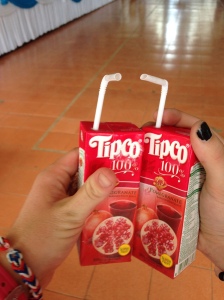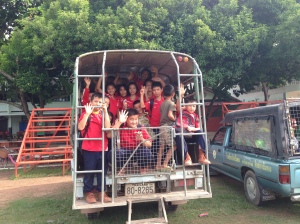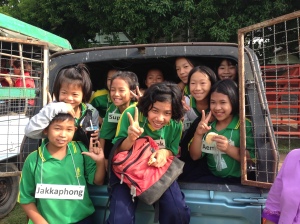Thai society places a huge emphasis on their students learning English. That is why I’m here and why so many other foreign white people come to Thailand to teach. It wasn’t until this weekend though, that I fully realized the power and beauty they put on someone who is white and speaks English.
In practical terms, English affords these students more opportunities in the future, as they can communicate with more people and have more job accessible to them. However, in terms of social stigma, this society puts so much value on a student that knows English, a teacher that teaches English, and above all, a person that fluently speaks English. At times, I have felt like royalty here. The kids call me beautiful but not the equally beautiful Thai teacher. I am given a salary almost twice that of some of the teachers who have been working at my elementary school for a decade. I don’t have to work Saturdays while almost every other teacher in the school does. And while most of these can be explained away with the simple fact that I am foreign, sometimes I wonder if it doesn’t have more to do with the color of my skin. Would a foreign black teacher get all these amenities?
Regardless of skin color, the fact that I natively speak English puts me on a pedestal in and of itself. And the kids who I teach are automatically put on the same pedestal in the ranks of the school system. My students are part of what is called the Mini English Program, and as such, they receive almost half of their total school time instruction in English. Other, lower level classes, only receive one hour of English a week and consequently have much lesser English capabilities. My kids are the prized possessions of the school. Their classrooms have plasma screen TVs while many of the other classrooms lack TV’s entirely. The teachers speak kindly and affectionately of them outside of class, while they have clear frustrations with the lower classes, calling the students slow and unintelligent. This is all simply because my kids have been given the opportunity to speak English everyday where the other classes only get English once a week.
At times I am baffled. I wonder why I was so lucky to be born in an English speaking country to a white family. Sometimes I am frustrated with how much power they give me simply because of the color of my skin and the language that I speak. I want my kids to feel powerful and confident without having to speak a different language or to wear whitening powder every morning so they will have a fairer complexion. But I know that I cannot change the rules of a society. What I can do, however, is offer my service to this community.
That is exactly what I did these last two weekends. After the four day weekend, our boss asked us to help at the English Camp the school has for other elementary schools in the area. It would be three days, Saturday and Sunday of one weekend and then the following Saturday of the next weekend. This meant we would work 12 days straight with only one day off before starting school the following week. But we knew we couldn’t refuse—an English camp without the American English teachers would be like arriving to a Starbucks only to find out there’s no coffee.
We were in charge of the “Conversation Fun” station, which consisted of teaching the kids how to say:
Good morning.
Good morning. How are you today?
I’m fine, thank you. How are you?
I’m fine, thank you.
This was the exact script we were given. And we stuck to it, teaching a total of 12 one-hour sessions, going over again and again and again how to pronounce the word morning, how to emphasize the n in fine, reminding every student that the word today meant today.
In the very first session of the first day I had kids staring at me with big eyes when I asked them to read a word. And even after I pointed to the word, said it three times, and pointed to it again, they would say nothing. There were times when I wanted to rip my hair out—“Why can’t they just read the gosh, darn, stinking word!?” I thought to myself. But then I reminded myself that these kids don’t speak English. They don’t even write in the same letters. So for them to read an English word, let alone say the word, is a giant feat.
My expectations for these kids had to be lower, I realized, than my own first and second graders. My students see me everyday for at least an hour. They have become accustomed to my directions, my games, and the way I explain new vocabulary. These kids might have never encountered a native English speaker before me. And while these realizations made it no less easy for the student to grasp the material, my patience grew ten fold. When a child simply couldn’t understand that the words “good morning” and my finger pointing to them on the page meant that he was supposed to read them, I didn’t get frustrated; I simply sat and waited for the child to think—really think—and then I would help them by saying the words myself.
At the end of each hour session I wondered if we had reached any kid at all. If any child really understood what “Good morning. How are you?” meant, but, again, I realized that none of that really mattered because at lunch time I had little girls following me around, just wanting any sort of attention from an English speaker. I had kids taking my picture at the end of the day so they could show their parents and friends at home the cool thing they had done that Saturday. These kids genuinely appreciated the opportunity to learn English from a native English speaker. To them, this was like going to Disneyland. And if that meant I had to give up my weekend to give them that gift and opportunity, then I was okay with that.
English Camp wasn’t always hard, though. After lunch we got to play games and sing songs with all the kids (there were about 100 kids there each day). One day a kid from each school came to the front of the auditorium to dance to a song we had just learned. The kid with the best dance, they were told, would get a prize. The way those kids’ hips moved! One boy danced so well (and ridiculously) that our Thai boss—Prakop—who hardly even smiles, was laughing so hard she couldn’t lead the kids in the song anymore. http://vimeo.com/101857911 (Watch this video NOW!) All of the teachers were doubled over laughing and we sung the song over and over again so the kids would keep dancing and we could keep laughing. There were moments in those one hour sessions, too, where we had said “good morning” one too many times and suddenly a game ensued of who could say good morning the fastest. A game where I was chanting cheers for my team and the kids would stare at me until they realized they could join in, then they would hoot and holler just as loud as me, their hands raised in the air and smiles spread across their faces.
It was a week and a half that while at times extremely challenging, taught me so very much not only about teaching and patience, but about the great joys that serving a community can bring you. Before this week I was feeling somewhat homesick. I was having one of those down moments you have when you live somewhere far away from home. I was questioning why I was here and couldn’t understand why I had ever agreed to teach English in a foreign country. But this weekend has revitalized me. It has taught me to learn and grow. To be frustrated and work through it. To serve even when it’s hard and all I want to do is go home and sleep. This weekend has allowed me to better understand the life of a Thai elementary school student and the emphasis that is placed on learning English. It has allowed me to see not only why the community places such power on me but also, how I can give that power back to the community.





This is your best post yet. Probably the hardest lesson that we cannot teach our children is how to work thru frustration. You need to learn this on your own and sounds like you have been successful!